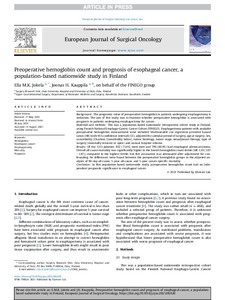Preoperative hemoglobin count and prognosis of esophageal cancer, a population-based nationwide study in Finland
Kauppila Joonas H; on behalf of the FINEGO group; Jokela Ella MK
https://urn.fi/URN:NBN:fi-fe2021100750366
Tiivistelmä
Background
The prognostic value of preoperative hemoglobin in patients undergoing esophagectomy is unknown. The aim of this study was to examine whether preoperative hemoglobin is associated with prognosis in patients undergoing esophagectomy for cancer.
Materials and methods
This was a population-based nationwide retrospective cohort study in Finland, using Finnish National Esophago-Gastric Cancer Cohort (FINEGO). Esophagectomy patients with available preoperative hemoglobin measurement were included. Multivariable cox regression provided hazard ratios (HR) with 95% confidence intervals (CI), adjusted for calendar period of surgery, age at surgery, sex, comorbidity (Charlson Comorbidity Index), tumor histology, tumor stage, neoadjuvant therapy, type of surgery (minimally invasive or open) and annual hospital volume.
Results
Of the 1313 patients, 932 (71.0%) were men and 799 (60.9%) had esophageal adenocarcinoma. Overall all-cause mortality was significantly higher in the lowest hemoglobin count tertile (HR 1.26 (1.07–1.47)) compared to the highest tertile, but this association was attenuated after adjustment for confounding. No differences were found between the preoperative hemoglobin groups in the adjusted analyses of 90-day all-cause, 5-year all-cause, and 5-year cancer-specific mortality.
Conclusion
In this population-based nationwide study, preoperative hemoglobin count had no independent prognostic significance in esophageal cancer.
Keywords
Hemoglobin; Esophageal cancer; Esophagectomy; Mortality; Prognosis
Kokoelmat
- Rinnakkaistallenteet [19207]
